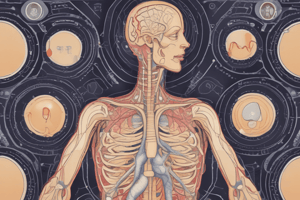Podcast
Questions and Answers
What is the primary function of testosterone secreted by the testes?
What is the primary function of testosterone secreted by the testes?
- To increase the metabolic rate of cells
- To promote blood coagulation
- To maintain reproductive organs and develop secondary sex characteristics (correct)
- To regulate water balance in the body
What is a key role of prostaglandins in the body?
What is a key role of prostaglandins in the body?
- Modulating pain and inflammation (correct)
- Facilitating muscle contraction
- Enhancing insulin secretion
- Regulating respiratory rate
Which hormone is primarily secreted by ovaries?
Which hormone is primarily secreted by ovaries?
- Estrogen & Progesterone (correct)
- Testosterone
- Cortisol
- Insulin
What effect do prostaglandins have on blood vessels?
What effect do prostaglandins have on blood vessels?
What system regulates the secretion of hormones from glands like the testes and ovaries?
What system regulates the secretion of hormones from glands like the testes and ovaries?
What is the primary role of Thyroxine (T4)?
What is the primary role of Thyroxine (T4)?
Which hormone is primarily responsible for maintaining normal blood calcium levels?
Which hormone is primarily responsible for maintaining normal blood calcium levels?
What effect does Calcitonin have on calcium levels in the blood?
What effect does Calcitonin have on calcium levels in the blood?
How does Parathyroid Hormone (PTH) affect bone metabolism?
How does Parathyroid Hormone (PTH) affect bone metabolism?
What is the function of the Islets of Langerhans in the pancreas?
What is the function of the Islets of Langerhans in the pancreas?
Which hormone, when secreted by the kidneys, is important for the intestinal absorption of calcium?
Which hormone, when secreted by the kidneys, is important for the intestinal absorption of calcium?
What role does negative feedback play in hormone regulation?
What role does negative feedback play in hormone regulation?
What is one of the main functions of hormones secreted by the adrenal gland?
What is one of the main functions of hormones secreted by the adrenal gland?
What is the primary function of hormones produced by the hypothalamus?
What is the primary function of hormones produced by the hypothalamus?
Which hormone is NOT produced by the anterior pituitary gland?
Which hormone is NOT produced by the anterior pituitary gland?
How does the posterior pituitary gland function in relation to hormones?
How does the posterior pituitary gland function in relation to hormones?
What is a key characteristic of the negative feedback mechanism in the endocrine system?
What is a key characteristic of the negative feedback mechanism in the endocrine system?
What is the primary structural feature of steroid hormones?
What is the primary structural feature of steroid hormones?
Which of the following hormones is classified as a nonsteroid hormone?
Which of the following hormones is classified as a nonsteroid hormone?
What impact do hormones have on target cells or organs?
What impact do hormones have on target cells or organs?
What type of hormone is typically produced in the adrenal cortex?
What type of hormone is typically produced in the adrenal cortex?
Flashcards are hidden until you start studying
Study Notes
Gonads
- The testes produce testosterone, which maintains reproductive organs and develops secondary sex characteristics in males.
- The ovaries create estrogen and progesterone, responsible for female reproductive organ maintenance and secondary sex characteristic development.
Prostaglandins
- Prostaglandins are lipid molecules produced by cells throughout the body.
- They act locally, influencing neighboring cells.
- They play a vital role in various bodily functions, including:
- Pain
- Inflammation
- Fever
- Blood clotting
- Vasodilation/constriction
Thyroid Hormones
- Thyroxine (T4) is the primary thyroid hormone, promoting energy and metabolism.
- Triiodothyronine (T3) also increases energy and metabolism.
- Calcitonin regulates blood calcium levels. When calcium levels are high, it triggers calcium deposition in bones.
Parathyroid Glands
- They are four small glands found in the thyroid gland's posterior capsule.
- The glands secrete parathyroid hormone (PTH), the primary hormone responsible for maintaining calcium blood levels.
Parathyroid hormone
- Its main function is to regulate blood calcium levels.
- PTH inhibits new bone formation and stimulates the breakdown of old bone to release calcium into the bloodstream.
- It encourages the kidneys to reabsorb calcium and activate vitamin D, crucial for calcium absorption in the intestines.
Pancreas
- It has both endocrine and exocrine functions.
- Endocrine cells (Islets of Langerhans) secrete hormones.
- Exocrine cells secrete digestive enzymes.
Islets of Langerhans
- These pancreatic cell clusters contain alpha and beta cells.
- Alpha cells release glucagon, which increases blood glucose levels.
- Beta cells produce insulin, which lowers blood glucose levels.
Regulation of Blood Glucose
- The pancreas plays a vital role in regulating blood glucose levels.
- Insulin lowers blood glucose levels by promoting glucose uptake in cells.
- Glucagon elevates blood glucose by stimulating glycogen breakdown in the liver.
Organs of the Endocrine System
- The endocrine system includes various organs producing and releasing hormones.
- These organs include:
- Hypothalamus
- Pituitary
- Thyroid
- Parathyroid
- Adrenal
- Pancreas
- Ovaries (females)
- Testes (males)
Endocrine System vs. Nervous System
- Endocrine System
- Utilizes hormones as messengers.
- Hormones travel through the bloodstream to target cells and tissues.
- Slow-acting, with long-lasting effects.
- Adapts slowly to continuous stimulation.
- Nervous System
- Employs neurotransmitters as signaling molecules.
- Neurotransmitters are released directly into synapses, affecting neighboring cells.
- Fast-acting, with short-lived effects.
- Adapts quickly to continuous stimulation.
Hormones
- Hormones are chemical messengers that regulate cellular or organ functions.
- Some act on many tissues, while others target specific ones.
- Hormones travel through the bloodstream until they encounter their designated receptor.
- Receptor binding triggers changes in the target cell or tissue.
Hormone Classifications
- Steroid Hormones
- Are made from cholesterol.
- Synthesized in cells of the adrenal cortex (e.g., aldosterone) and sex glands (e.g., estrogen, testosterone).
- Can easily pass through cell membranes.
- Nonsteroid Hormones
- Are derived from proteins or amino acids.
- Unable to penetrate cell membranes.
- Bind to receptors on the cell surface.
- Examples include insulin, anti-diuretic hormone (ADH), epinephrine, and norepinephrine.
Studying That Suits You
Use AI to generate personalized quizzes and flashcards to suit your learning preferences.




